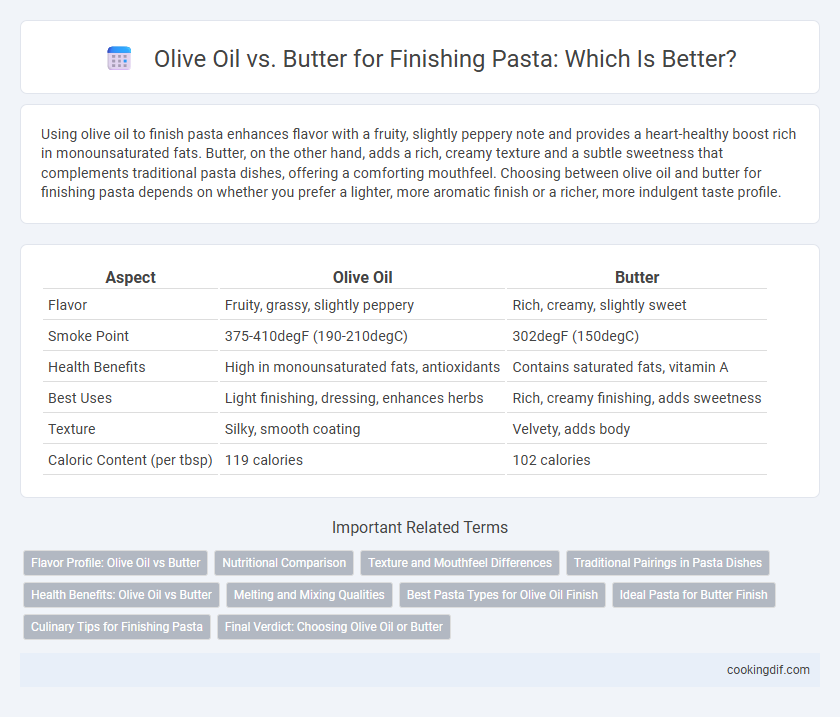Using olive oil to finish pasta enhances flavor with a fruity, slightly peppery note and provides a heart-healthy boost rich in monounsaturated fats. Butter, on the other hand, adds a rich, creamy texture and a subtle sweetness that complements traditional pasta dishes, offering a comforting mouthfeel. Choosing between olive oil and butter for finishing pasta depends on whether you prefer a lighter, more aromatic finish or a richer, more indulgent taste profile.
Table of Comparison
| Aspect | Olive Oil | Butter |
|---|---|---|
| Flavor | Fruity, grassy, slightly peppery | Rich, creamy, slightly sweet |
| Smoke Point | 375-410degF (190-210degC) | 302degF (150degC) |
| Health Benefits | High in monounsaturated fats, antioxidants | Contains saturated fats, vitamin A |
| Best Uses | Light finishing, dressing, enhances herbs | Rich, creamy finishing, adds sweetness |
| Texture | Silky, smooth coating | Velvety, adds body |
| Caloric Content (per tbsp) | 119 calories | 102 calories |
Flavor Profile: Olive Oil vs Butter
Olive oil imparts a robust, fruity, and slightly peppery flavor to pasta, enhancing Mediterranean dishes with its fresh and aromatic notes. Butter offers a rich, creamy, and slightly nutty taste that adds depth and smoothness, complementing delicate sauces and comfort-food pasta recipes. Choosing between olive oil and butter depends on the desired flavor profile, with olive oil providing brightness and butter delivering indulgent richness.
Nutritional Comparison
Olive oil provides a rich source of monounsaturated fats and antioxidants such as vitamin E, supporting heart health and reducing inflammation. Butter contains higher levels of saturated fat and cholesterol, which may increase the risk of cardiovascular disease when consumed in excess. Choosing olive oil for finishing pasta enhances nutritional value by promoting healthier fat intake and offering beneficial plant compounds.
Texture and Mouthfeel Differences
Olive oil provides a smooth, slightly silky texture with a light, fruity mouthfeel that enhances the pasta's natural flavors without overpowering them. Butter creates a rich, creamy coating, delivering a velvety, indulgent sensation that adds depth and a subtle sweetness to the dish. The choice between olive oil and butter significantly impacts the pasta's overall texture, with olive oil offering a lighter finish and butter yielding a more luxurious mouthfeel.
Traditional Pairings in Pasta Dishes
Olive oil is traditionally paired with pasta dishes like aglio e olio and puttanesca, enhancing flavors with its fruity, peppery notes and providing a lighter finish. Butter is often used in rich, creamy pasta sauces such as fettuccine Alfredo and carbonara, adding a smooth, velvety texture and depth to the dish. Both fats complement different regional Italian pasta recipes, reflecting their unique culinary traditions.
Health Benefits: Olive Oil vs Butter
Olive oil contains heart-healthy monounsaturated fats and antioxidants that reduce inflammation and improve cholesterol levels, making it a superior choice for finishing pasta. Butter, rich in saturated fats and cholesterol, can increase the risk of cardiovascular diseases when consumed in excess. Choosing olive oil over butter enhances the nutritional profile of pasta by providing essential nutrients without compromising heart health.
Melting and Mixing Qualities
Olive oil excels in coating pasta evenly with a smooth texture, enhancing flavor through its liquid state at room temperature and quick melding with sauces. Butter melts and integrates into pasta by creating a creamy, rich consistency, its fat content allowing it to emulsify with pasta water for a velvety finish. The choice between olive oil and butter depends on the desired mouthfeel and flavor profile, with olive oil providing a lighter, fruitier note and butter delivering a luscious, decadent experience.
Best Pasta Types for Olive Oil Finish
Extra virgin olive oil pairs exceptionally well with pasta types like spaghetti, linguine, and bucatini, enhancing their texture and delivering a fresh, fruity flavor. Penne and fusilli also benefit from an olive oil finish, as the oil clings to their ridges and hollow shapes, ensuring every bite is infused with richness. In contrast to butter's creamy finish, olive oil provides a lighter, more vibrant taste that complements olive oil-friendly pasta sauces such as aglio e olio and pesto.
Ideal Pasta for Butter Finish
Butter finish best suits rich, creamy pasta dishes like fettuccine Alfredo or carbonara where its smooth texture complements the sauce. Olive oil pairs well with lighter pastas such as aglio e olio or seafood-based recipes due to its fruity and slightly peppery flavor. Choosing butter enhances the decadence of egg-based or cheese-heavy pastas, creating a velvety coating that elevates every bite.
Culinary Tips for Finishing Pasta
Olive oil adds a rich, fruity aroma and helps create a glossy finish on pasta, enhancing flavor without overpowering the dish. Butter contributes a creamy, velvety texture and a subtle sweetness, perfect for enriching sauces like Alfredo or carbonara. Combining both can balance flavor and texture, giving pasta a luxurious mouthfeel and a well-rounded taste.
Final Verdict: Choosing Olive Oil or Butter
Choosing olive oil or butter for finishing pasta depends on desired flavor and texture; olive oil imparts a fruity, slightly peppery taste with a lighter mouthfeel, while butter provides a rich, creamy, and smooth finish. Olive oil is often preferred in Mediterranean dishes for its health benefits and vibrant aroma, whereas butter enhances comfort-food profiles with its indulgent richness. For a balanced approach, some chefs combine both to achieve complexity in taste and a silky texture.
Olive oil vs butter for finishing Infographic

 cookingdif.com
cookingdif.com